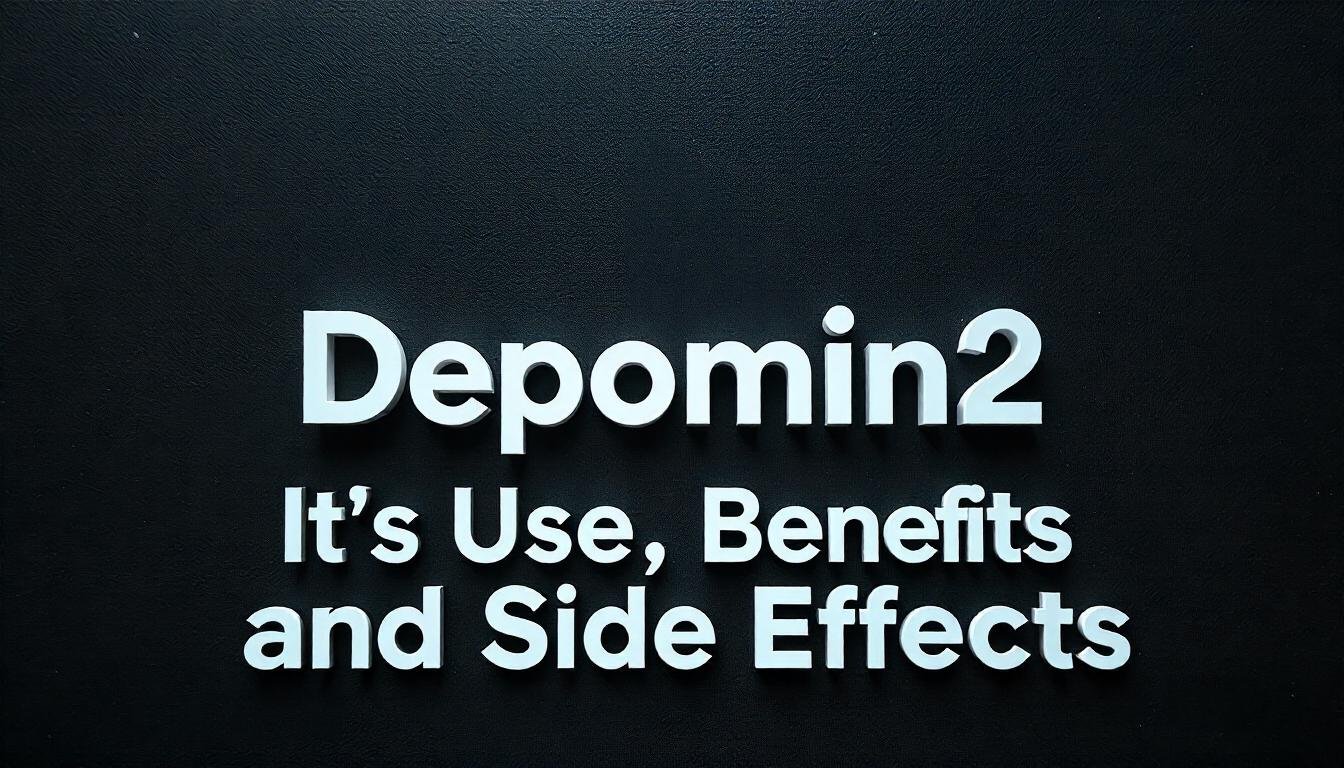Health & Fitness
Depomin82 Its Uses, Benefits, and Side Effects

Depomin82 is a pharmaceutical product primarily used for the treatment of certain mental health conditions, most notably those related to depression and mood disorders. Its active ingredient is typically a form of antidepressant that falls under the category of selective serotonin reuptake inhibitors (SSRIs) or other related classes of drugs designed to balance the brain’s chemical levels.
In this article, we’ll explore what Depomin82 is, how it works, its medical uses, potential side effects, and other important information for users.
What is Depomin82?
Depomin82 is a branded or generic medication that is commonly prescribed to treat a range of mental health conditions. It is most often used in the management of depression, anxiety disorders, and sometimes for conditions like obsessive-compulsive disorder (OCD) or panic attacks. The medication works by influencing the levels of serotonin in the brain, a neurotransmitter that plays a key role in regulating mood, emotions, and overall well-being.
While the specific formulation and dosage can vary, Depomin82 is generally part of a broader family of drugs designed to enhance serotonin activity, which in turn helps improve mood and reduce symptoms of depression and anxiety.
How Does Depomin82 Work?
The active compounds in Depomin82 typically belong to the class of selective serotonin reuptake inhibitors (SSRIs), which function by blocking the reabsorption (or reuptake) of serotonin in the brain. By preventing this reuptake, the medication helps to increase serotonin levels in the brain, which is thought to improve communication between nerve cells and enhance mood regulation.
As serotonin levels rise, individuals taking Depomin82 may experience a reduction in symptoms of anxiety, sadness, and other depressive symptoms. The specific mechanism through which serotonin influences mood and emotions is complex, but improving serotonin function is associated with more stable emotional responses and better overall mental health.
Medical Uses of Depomin82
Depomin82 is used to treat a variety of mental health conditions. Some of the primary conditions for which it may be prescribed include:
- Major Depressive Disorder (MDD): Depomin82 is commonly prescribed for individuals diagnosed with depression. It can help reduce the severity of depressive symptoms, such as sadness, fatigue, loss of interest in activities, and feelings of hopelessness.
- Generalized Anxiety Disorder (GAD): This drug is also effective in managing generalized anxiety, where a person experiences excessive, uncontrollable worry or nervousness that interferes with daily life.
- Obsessive-Compulsive Disorder (OCD): Depomin82 may be prescribed to help reduce the frequency and intensity of compulsive behaviors or obsessive thoughts associated with OCD.
- Panic Disorder: People with panic attacks or panic disorder may be prescribed Depomin82 to manage their symptoms and reduce the occurrence of unexpected panic episodes.
- Social Anxiety Disorder (SAD): This medication can also be effective in treating social anxiety disorder, which is characterized by an intense fear of being judged or scrutinized in social or performance situations.
Potential Side Effects
While Depomin82 can be very effective in treating various mental health conditions, like all medications, it may cause side effects. Some of the more common side effects associated with Depomin82 include:
- Nausea or upset stomach
- Fatigue or drowsiness
- Dizziness or lightheadedness
- Insomnia or difficulty sleeping
- Dry mouth
- Sexual dysfunction (e.g., reduced libido, erectile dysfunction)
These side effects are usually mild and tend to improve after a few days or weeks of use as the body adjusts to the medication. However, some individuals may experience more severe side effects, such as:
- Severe allergic reactions (e.g., rash, itching, swelling)
- Suicidal thoughts or behaviors, especially in young adults and adolescents
- Serotonin syndrome, a rare but serious condition caused by too much serotonin in the brain, which can lead to symptoms like confusion, rapid heart rate, high blood pressure, and fever
Patients are encouraged to monitor their health closely and report any concerning symptoms to their healthcare provider.
Dosage and Administration
Depomin82 should be taken as prescribed by a healthcare professional. It is typically available in tablet form and is taken orally, with or without food. The exact dosage will depend on the individual’s condition, age, and response to treatment. Generally, the starting dose is low, and the healthcare provider may gradually increase the dosage over time to minimize side effects and ensure the best possible therapeutic effect.
It is important to follow the prescribed dosage schedule and avoid altering the dose without consulting a healthcare provider. Stopping Depomin82 abruptly can lead to withdrawal symptoms, so it is crucial to work with a doctor when discontinuing the medication.
Warnings and Precautions
Before taking Depomin82, individuals should inform their healthcare provider of any pre-existing medical conditions, including liver or kidney problems, heart disease, or a history of seizures. People with a history of substance abuse or those who are pregnant or breastfeeding should also consult their doctor before taking this medication.
It is essential for healthcare providers to monitor patients closely, especially during the initial stages of treatment or if the dosage is adjusted. Regular follow-up appointments help ensure the medication is working effectively and that any side effects are managed appropriately.
Conclusion
Depomin82 is a widely used medication for the treatment of depression, anxiety, and other related mental health conditions. By balancing serotonin levels in the brain, it helps improve mood and emotional regulation, making it an important tool in managing chronic mental health issues. However, like all medications, it comes with potential side effects, so it’s important for individuals to work closely with their healthcare provider when using Depomin82 to ensure optimal results and safety.
As with any mental health treatment, Depomin82 is most effective when used as part of a comprehensive treatment plan, which may include therapy, lifestyle adjustments, and other supportive interventions. If you or someone you know is struggling with depression or anxiety, it’s crucial to seek professional help to determine the best treatment options available.
Frequently Asked Questions
1. What is Depomin82 used for?
Depomin82 is primarily used for treating mental health conditions such as major depressive disorder (MDD), generalized anxiety disorder (GAD), obsessive-compulsive disorder (OCD), panic disorder, and social anxiety disorder (SAD). It works by increasing serotonin levels in the brain, which helps improve mood and reduce anxiety.
2. How does Depomin82 work?
Depomin82 is typically a selective serotonin reuptake inhibitor (SSRI). It works by blocking the reuptake of serotonin, a neurotransmitter that helps regulate mood. By preventing serotonin from being reabsorbed into nerve cells, Depomin82 increases serotonin levels, which helps stabilize mood and improve emotional well-being.
3. What are the side effects of Depomin82?
Common side effects of Depomin82 include nausea, dry mouth, fatigue, dizziness, and difficulty sleeping. Some people may experience sexual dysfunction or changes in appetite. Serious side effects, though rare, can include suicidal thoughts, serotonin syndrome, or allergic reactions.
4. How should I take Depomin82?
Depomin82 is typically taken once a day in the form of a tablet. It can be taken with or without food. The dosage varies depending on your condition and response to the medication, so it’s essential to follow your doctor’s instructions carefully. Do not stop or adjust the dosage without consulting your healthcare provider.
5. What should I do if I miss a dose of Depomin82?
If you miss a dose of Depomin82, take it as soon as you remember, unless it is close to your next scheduled dose. In that case, skip the missed dose and resume your regular dosing schedule. Do not take two doses at once to make up for a missed dose, as this can increase the risk of side effects.
Health & Fitness
Discovering the Health Benefits of Ceñillin

Ceñillin is a traditional tool deeply embedded in cultural practices, often recognized for its role in daily life and ceremonial activities. Beyond its historical and cultural significance, ceñillin also carries various health benefits that contribute to both physical and mental wellness. These benefits, which have been appreciated for centuries, are rooted in ceñillin’s connection to mindfulness, natural materials, and holistic health approaches. This article will explore the health benefits of ceñillin, shedding light on its ancient wisdom and its relevance in modern wellness.
Ceñillin as a Tool for Mindfulness and Stress Relief
One of the most profound benefits of ceñillin lies in its ability to promote mindfulness. In traditional practices, the use of ceñillin often required focus and patience, encouraging individuals to be present in the moment. This intentionality mirrors modern mindfulness techniques, which are known to reduce stress, improve mental clarity, and enhance emotional balance.
Mindfulness Benefits of Ceñillin:
- Increased Mental Clarity: The act of engaging with ceñillin, whether during its creation or in daily tasks, promotes a mindful state of being. This can lead to improved concentration and mental focus.
- Stress Reduction: Similar to meditation, the repetitive actions associated with using ceñillin help calm the mind, reducing anxiety and stress levels.
- Emotional Balance: By fostering a deeper connection with the present moment, ceñillin can contribute to emotional stability and a sense of inner peace.
In today’s fast-paced world, mindfulness practices are essential for maintaining mental health, and ceñillin offers a tangible way to integrate these practices into daily life. Whether through crafting ceñillin or incorporating it into personal rituals, its meditative qualities make it an effective tool for stress relief.
Physical Health Benefits of Ceñillin
Ceñillin’s health benefits extend beyond mental wellness, as it also has positive effects on physical health. Traditionally, ceñillin was often made using natural materials like wood, bone, or metal, which possess properties that can benefit the body.
Ergonomic and Physical Health Advantages:
- Improved Hand-Eye Coordination: Working with ceñillin, especially in its crafting process, requires precision and dexterity. This improves hand-eye coordination and fine motor skills, which are vital for overall physical health, particularly in older adults.
- Reduced Muscle Tension: Many traditional ceñillin practices involved movements that helped stretch and engage muscles, promoting relaxation and reducing physical tension.
- Connection to Nature: Ceñillin’s use of natural materials allows individuals to reconnect with nature, offering grounding benefits that support overall physical health.
In addition to these benefits, the tactile experience of ceñillin—whether through crafting or using the object—encourages physical engagement and enhances sensory awareness. These subtle yet significant physical interactions contribute to a more balanced and holistic approach to wellness.
Promoting Emotional Wellness Through Tradition
The emotional wellness benefits of ceñillin are closely linked to its role in cultural preservation and connection to tradition. Engaging with ceñillin can evoke feelings of belonging, continuity, and emotional grounding. In many cultures, ceñillin was passed down through generations, representing not only an object but also a legacy of family and community values.
Emotional Health Benefits:
- Sense of Belonging: For those connected to the cultural heritage of ceñillin, engaging with this traditional tool fosters a strong sense of identity and belonging.
- Healing from Emotional Trauma: Cultural practices that include ceñillin have historically been used as part of healing ceremonies, helping individuals recover from emotional trauma by reconnecting them with their roots.
- Increased Self-Awareness: The mindful engagement with ceñillin encourages self-reflection, leading to improved emotional intelligence and resilience.
In the context of emotional wellness, ceñillin serves as a bridge between the past and present, helping individuals maintain a sense of identity and connection. This emotional grounding is particularly beneficial for those experiencing feelings of displacement, isolation, or emotional imbalance.
Cultural and Spiritual Health Benefits of Ceñillin
For centuries, ceñillin has been more than just a tool—it has carried deep spiritual significance in various cultures. In many cases, ceñillin was used in rituals that were believed to have healing properties, both for the individual and the community. This spiritual dimension of ceñillin continues to resonate in modern wellness practices, where cultural rituals are being revived as a way to promote holistic health.
Spiritual Wellness Benefits:
- Connection to Ancestors: Ceñillin often plays a role in honoring ancestors, which can provide a sense of spiritual continuity and support.
- Healing Rituals: The use of ceñillin in ceremonies is believed to promote healing by balancing the energies of the body and spirit. In modern times, this can be likened to energy healing practices such as Reiki.
- Enhancement of Meditation Practices: Ceñillin’s role in mindfulness and spiritual practices makes it an effective tool for enhancing meditation and achieving a deeper sense of spiritual awareness.
For those seeking spiritual wellness, ceñillin offers a meaningful way to reconnect with cultural practices while promoting inner harmony and balance. Its use in rituals and ceremonies aligns with holistic approaches to health, where the body, mind, and spirit are considered interconnected.
Environmental and Sustainability Health Benefits
Another key benefit of ceñillin lies in its connection to sustainability and environmental health. Traditionally made from natural, locally sourced materials, ceñillin promotes eco-conscious living and reduces the environmental impact of modern manufacturing processes.
Eco-Friendly Benefits of Ceñillin:
- Sustainable Materials: Ceñillin was historically crafted using natural materials that were readily available in the environment, making it an eco-friendly alternative to mass-produced items.
- Reduction of Environmental Stress: The slow, mindful creation of ceñillin contrasts with today’s fast-paced, industrialized production, offering a model for reducing environmental stress and promoting sustainability.
- Encouragement of Local Craftsmanship: By supporting traditional artisans who craft ceñillin, modern users can contribute to local economies and the preservation of sustainable practices.
Incorporating ceñillin into wellness routines also encourages mindfulness around environmental health. The traditional practices associated with ceñillin emphasize the importance of living in harmony with nature, which in turn supports a healthier ecosystem and community.
Ceñillin in Modern Wellness Practices
In today’s wellness landscape, ceñillin holds a unique place as a tool that bridges ancient traditions with modern practices. As people seek ways to reduce stress, improve mindfulness, and promote sustainable living, ceñillin offers a holistic approach that addresses multiple dimensions of health.
Incorporating Ceñillin Into Your Wellness Routine:
- Mindfulness Practices: Use ceñillin in daily mindfulness exercises to reduce stress and improve focus. Simply holding or working with ceñillin can enhance a sense of calm and relaxation.
- Cultural Rituals: Incorporate ceñillin into cultural or personal rituals as a way to reconnect with your heritage or explore spiritual growth.
- Physical Engagement: Whether crafting ceñillin or using it as a tool, the physical engagement promotes better hand-eye coordination and overall physical health.
- Environmental Awareness: By using ceñillin, you support sustainable practices and eco-conscious living, contributing to both personal wellness and environmental health.
Ceñillin’s versatility in modern wellness practices highlights its relevance in today’s holistic health movements. Whether for mindfulness, physical engagement, emotional healing, or environmental consciousness, ceñillin serves as a powerful tool for enhancing overall wellness.
Celebrating the Health Benefits of Ceñillin
In celebrating ceñillin, we recognize its invaluable contributions to holistic health. From its origins as a traditional tool to its modern applications in mindfulness, physical wellness, and spiritual growth, ceñillin’s enduring legacy offers profound benefits for both body and mind. By integrating ceñillin into contemporary wellness practices, we honor its rich history while embracing a holistic approach to health that nourishes the whole person.
FAQs
What is Ceñillin, and how does it benefit health?
Ceñillin is a traditional tool with roots in various cultural practices. Its health benefits include promoting mindfulness, reducing stress, improving physical coordination, and supporting emotional and spiritual wellness.
How can Ceñillin reduce stress?
The repetitive, mindful use of ceñillin encourages focus and relaxation, similar to meditation practices. This helps reduce anxiety and promotes emotional balance.
Is Ceñillin still used in modern wellness practices?
Yes, ceñillin is being reintroduced into modern wellness practices, particularly in mindfulness exercises, cultural rituals, and eco-conscious living.
Can Ceñillin improve physical health?
Yes, ceñillin can enhance hand-eye coordination, fine motor skills, and sensory awareness. Its ergonomic design encourages physical engagement that supports overall health.
What are the environmental benefits of using Ceñillin?
Ceñillin is traditionally made from natural, sustainable materials, promoting eco-friendly practices. Using ceñillin supports local artisans and reduces the environmental impact associated with mass production.
How does Ceñillin promote spiritual wellness?
Ceñillin has been used in cultural rituals and spiritual practices for centuries. It enhances meditation, connects individuals to their heritage, and promotes spiritual healing and balance.
Health & Fitness
The Benefits of Ketamine Therapy for Mental Health

Ketamine therapy is increasingly gaining attention as an innovative option in mental health care. Originally known as an anesthetic, ketamine has shifted into broader applications, particularly in addressing various mental health conditions. Administered under medical supervision, it offers a promising approach for individuals who may not have found relief through traditional treatments.
An Overview of Ketamine Therapy
Ketamine therapy uses ketamine, either through IV infusions or a nasal spray, to treat mental health symptoms. Unlike traditional treatments, which take weeks, this approach often provides faster relief. Initially developed for other purposes, it was later found to impact mood-regulating brain functions. Targeting the brain’s glutamine system it enhances neural connections and supports processes linked to mood stabilization.
Conditions That May Benefit from Ketamine Therapy
Ketamine therapy is gaining attention as a potential treatment for various mental health conditions. It is often recommended for individuals with treatment-resistant depression. That said, its uses go beyond this specific condition.
- Symptoms such as overwhelming sadness, hopelessness, or excessive worry can significantly impact daily life. For some patients, alternative therapies offer rapid relief, particularly when other treatments have fallen short.
- Post-Traumatic Stress Disorder (PTSD): PTSD often results from exposure to traumatic events, leading to flashbacks, heightened anxiety, or emotional numbness. Certain therapies have shown promise in reducing these symptoms for some individuals.
- Bipolar Disorder: Managing bipolar disorder traditionally requires a combination of medication and therapy. Alternative approaches may serve as a complementary option, particularly during depressive episodes.
- Suicidal Thoughts: One of the most well-documented uses for some therapies is their ability to reduce suicidal ideation in certain patients. Their rapid action makes them a unique tool compared to traditional antidepressants.
Difference Between Ketamine Therapy and Traditional Treatments
Most traditional mental health treatments, like antidepressants or talk therapy, can take weeks or months to show results. Therapy often provides quicker relief, sometimes within hours or days. Ketamine works like a “reset button” for the brain’s neural pathways. Unlike treatments that only adjust neurotransmitter levels like serotonin or dopamine, it targets the brain’s glutamine system, directly affecting mood regulation. This therapy is highly personalized, with each treatment tailored to the patient’s medical history, symptoms, and response.
Long-Term Impacts of Ketamine Therapy
While ketamine therapy is not a cure for mental health disorders, its long-term potential lies in symptom management and improved quality of life. Some patients report sustained benefits after several treatment sessions, while others combine ketamine therapy with ongoing mental health care for optimal results. By alleviating acute symptoms, the therapy can allow patients to engage more effectively with additional treatments, such as psychotherapy or medications.
Safety Measures for Administration
The administration of ketamine therapy requires a controlled and professional environment. Treatments are typically conducted in medical clinics so that healthcare providers can monitor patients closely. Before beginning a session, a thorough psychiatric evaluation helps determine the therapy’s suitability for each individual. During treatment, patients are monitored for side effects like drowsiness or mild dissociation. This attentive care minimizes risks and allows adjustments based on patient reactions.
Exploring the Potential of Ketamine Therapy
Ketamine therapy represents a significant development in mental health treatments for conditions like depression, anxiety, PTSD, and bipolar disorder. Its potential for rapid symptom relief, paired with its ability to reduce suicidal thoughts, sets it apart from traditional approaches. When administered under proper medical guidance, ketamine therapy provides a safe and tailored option for those seeking to improve their mental well-being. To learn more about how this therapy could help, consult a qualified medical provider today.
Health & Fitness
How to Overcome Social Anxiety with Professional Therapy

Social anxiety can feel overwhelming and isolating, affecting both personal and professional aspects of life. It creates a sense of fear or unease in social situations, causing people to avoid meetings, gatherings, or even everyday interactions. A social anxiety therapist can offer many individuals a way to tackle and manage the challenges associated with social anxiety.
What Causes Anxiety?
Anxiety is a response to perceived threats or pressure. While it is a natural part of human functioning that helps individuals identify concerns in their surroundings, it can become problematic when it interferes with daily life. Factors contributing to anxiety may include:
- Genetics: A family history of anxiety disorders could predispose an individual to similar challenges.
- Environmental Influences: Stressful events, childhood trauma, or sustained high-pressure environments can heighten anxiety levels.
- Biological Factors: Imbalances in brain chemicals such as serotonin and dopamine may play a role.
- Cognitive Patterns: Negative thought processes or excessive worry about the future can exacerbate feelings of anxiety.
What is Social Anxiety?
Social anxiety, also referred to as social anxiety disorder, is a condition characterized by a debilitating fear of social situations. It extends beyond occasional nervousness, persisting in ways that significantly limit a person’s ability to connect or communicate with others. Individuals with social anxiety often have concerns about judgment, embarrassment, or rejection. Symptoms may include:
- Intense avoidance of social gatherings
- Sweating, trembling, and other physical reactions in social settings
- Difficulty speaking or maintaining eye contact
- Persistent negative self-talk centered on social interactions
How Can a Social Anxiety Therapist Help?
Therapy serves as a targeted approach to tackling the thought patterns and behaviors that fuel social anxiety. Various therapeutic methods provide individuals with the tools to better manage their symptoms and collaborate in improving their quality of life, some of which include:
Cognitive Behavioral Therapy (CBT)
CBT is commonly used to address social anxiety. It focuses on challenging negative beliefs and replacing them with constructive thinking patterns. If an individual often believes they will embarrass themselves while speaking up in a group, CBT encourages them to dissect and reframe that belief.
Supportive Counseling
For those more comfortable with open-ended discussion, supportive counseling fosters a safe and nonjudgmental environment. A social anxiety therapist can guide clients to explore the underlying causes of their anxiety. They offer tools and coping mechanisms to respond to social challenges more effectively.
Individualized Approaches
Some professionals combine multiple techniques to tailor their methods based on a person’s unique needs. Whether this means integrating mindfulness or focusing on specific life scenarios, customized approaches often yield effective results. Therapy benefits individuals navigating social anxiety by providing structured strategies to understand and manage their symptoms.
Picking the Right Therapist
Finding the right therapist is a collaborative process. A supportive professional can guide you through understanding your challenges and selecting an appropriate treatment plan. Begin by identifying professionals experienced in treating social anxiety or anxiety disorders. Look for licensed therapists, psychologists, or counselors who specialize in CBT, mindfulness-based treatments, group therapy, or another effective form of therapy.
During your initial sessions, ask about their experience with cases similar to yours and share your goals for therapy. Professional therapy is an effective avenue to address social anxiety. By working through thought patterns and behaviors, individuals can regain stability and participate more fully in their lives.
-

 Technology2 weeks ago
Technology2 weeks agointernet chicks: A Digital Phenomenon
-

 Recipes9 months ago
Recipes9 months agoCrab Brulee Recipe: A Gourmet Delight
-

 Recipes9 months ago
Recipes9 months agoSmoothie CCL: A Delicious and Nutritious Trend
-

 FOOD2 weeks ago
FOOD2 weeks agoÇeciir: A Journey Through Turkish Cuisine
-

 FOOD9 months ago
FOOD9 months agoCornflake Meringue Cookies
-

 FOOD9 months ago
FOOD9 months agoNasi Uduk
-

 Recipes9 months ago
Recipes9 months agoThe Ultimate Bug Juice Camp Drink Recipe for Fun and Flavor
-

 BLOGS9 months ago
BLOGS9 months agoUnveiling the Innovation: BoltBól – Revolutionizing Accessibility and Mobility
